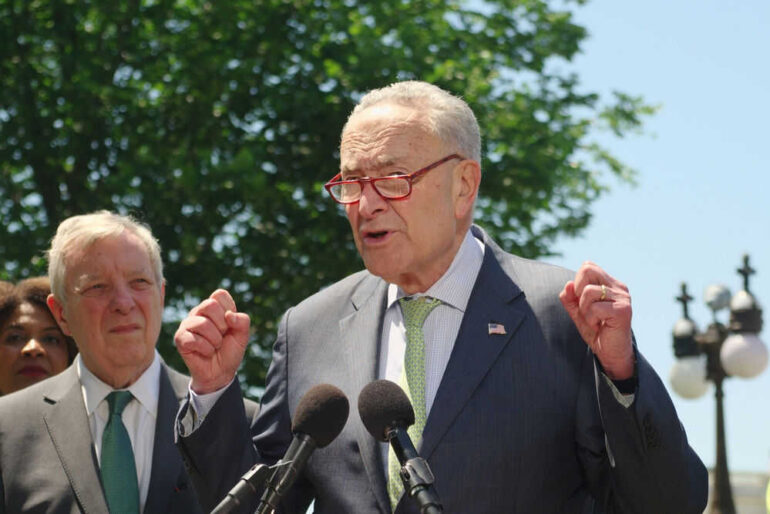🔴 Website 👉 https://u-s-news.com/
Telegram 👉 https://t.me/usnewscom_channel
(LibertySociety.com) – When the threat of a government shutdown hovers, the fate of millions lies in the hands of a Congress that can barely agree on lunch, let alone the nation’s finances.
Story Overview
- Schumer and Jeffries demand bipartisan action as Congress faces an end-of-September shutdown deadline.
- Recent history of stopgap funding and partisan showdowns sets the stage for another high-stakes standoff.
- Republicans push for future spending cuts while Democrats warn of chaos and hardship if compromise fails.
- Federal agencies, social programs, and the broader public brace for fallout if gridlock prevails.
Shutdown Countdown: Democrats Sound the Alarm
Congress returns from its August recess facing a fiscal time bomb: government funding runs dry at September’s end. Senate Minority Leader Chuck Schumer and House Minority Leader Hakeem Jeffries wasted no time, issuing urgent calls for bipartisan cooperation. Their warning is crystal clear, without a deal, the nation will face yet another disruptive shutdown, with non-essential federal operations grinding to a halt and millions left in financial limbo. The clock is ticking, and the stakes are rising.
Schumer’s September 2 letter to Senate colleagues didn’t mince words. He blasted what he called a “go-at-it-alone” Republican approach, arguing that only genuine bipartisan negotiation can avert chaos. Jeffries echoed this message, emphasizing that brinkmanship risks real harm to families, workers, and the most vulnerable. Their sense of urgency stems from a recent history of budgetary standoffs: the last-minute continuing resolution in March 2025 only postponed this reckoning. Now, with that funding expiring, the pressure cooker returns to full boil.
Political Divide: Competing Visions and Relentless Gridlock
House Speaker Mike Johnson and his Republican caucus are charting a sharply different course. Their strategy centers on deep spending reductions and stricter fiscal discipline for the next fiscal year. Democrats, meanwhile, are adamant about protecting social programs and extending key initiatives like Medicare and disaster relief. These clashing priorities have kept Congress locked in a pattern of temporary fixes and lurching from crisis to crisis. Neither side shows signs of blinking, at least not yet.
The power struggle is amplified by razor-thin majorities and the influence of ideological factions such as the Freedom Caucus and the Progressive Caucus. Negotiations swirl behind closed doors, but the public messages remain combative. Schumer and Jeffries accuse Republicans of using shutdown threats as leverage; Republicans counter that Democrats refuse to reckon with ballooning deficits. Both narratives play to their political bases, but offer little comfort to those caught in the crossfire, federal workers, contractors, and Americans relying on timely government services.
Ripple Effects: Economic, Social, and Political Fallout
Shutdowns are never just political theater. When appropriations lapse, the consequences cascade across the country. Federal employees face furloughs and missed paychecks. Vital programs, like Temporary Assistance for Needy Families (TANF), Medicare, and FEMA’s flood insurance, teeter on the edge of disruption. The broader economy absorbs the shock, with market volatility and potential GDP slowdowns looming over families and businesses. Every partisan standoff chips away at public trust, leaving many to wonder if Congress can govern at all.
Experts warn that repeated shutdown threats are more than a nuisance; they erode confidence in American institutions. Policy analysts point to the growing reliance on continuing resolutions, short-term funding patches that paper over deeper disputes, as a sign of systemic dysfunction. Economists, meanwhile, stress that even temporary disruptions have lasting costs, from delayed government payments to lost economic output. For the over-40 crowd who’ve seen this movie before, the frustration is palpable: why do the same political battles keep replaying, with ordinary citizens left holding the bag?
What’s Next: Will Common Sense or Chaos Prevail?
Negotiations continue, but no final budget deal is in sight. Schumer and Jeffries keep hammering their message, only compromise can keep the government open. Johnson and his allies remain committed to cuts, betting that voters want fiscal restraint. Both sides recognize the risks, but neither wants to be blamed for the fallout. As the deadline draws near, the question lingers: will political survival instincts force a last-minute deal, or will partisan pride drive the nation into another costly shutdown?
The only certainty is uncertainty. For now, federal agencies gird for disruption, families watch the headlines with anxiety, and the country waits to see if its leaders will choose common sense over chaos. The outcome will shape not just the nation’s finances, but its faith in democracy itself.
Copyright 2025, LibertySociety.com .
This content is courtesy of, and owned and copyrighted by, https://libertysociety.com and its author. This content is made available by use of the public RSS feed offered by the host site and is used for educational purposes only. If you are the author or represent the host site and would like this content removed now and in the future, please contact USSANews.com using the email address in the Contact page found in the website menu.

